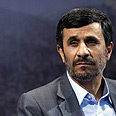
Ahmadinejad. Not popular
צילום: רויטרס
UAE ambassador to US supports Iran strike
Yousef al-Otaiba quoted as saying benefits of bombing Islamic Republic's nuclear facilities outweigh short-term costs such attack would impose. 'We cannot live with a nuclear Iran'
A United Arab Emirates official believes a strike against Iran's nuclear facilities should be seriously considered if international sanctions fail to stop the Islamic Republic's quest for nuclear weapons, the Washington Times reported Wednesday.
According to the report, that UAE ambassador to the US said Tuesday that the benefits of bombing Iran's nuclear facilities outweighed the short-term costs such an attack would impose.
The unusual remark was made by Ambassador Yousef al-Otaiba after a public interview session with the Atlantic magazine at the Aspen Ideas Festival. According to the Times, he estimated that such a strike would spark a wave of protest in Muslim countries and perhaps worldwide as well, but clarified that he favored that over a nuclear Iran.
"I think it's a cost-benefit analysis," Otaiba explained. "I think despite the large amount of trade we do with Iran, which is close to $12 billion… there will be consequences, there will be a backlash and there will be problems with people protesting and rioting and very unhappy that there is an outside force attacking a Muslim country; that is going to happen no matter what.
"If you are asking me, 'Am I willing to live with that versus living with a nuclear Iran?,' my answer is still the same: 'We cannot live with a nuclear Iran.' I am willing to absorb what takes place at the expense of the security of the UAE," he stressed.
According to the Times report, Otaiba's remarks echo those of some Arab diplomats who have said similar things in private to their American counterparts but never this bluntly in public.
John R. Bolton, former US ambassador to the United Nations, said the comments reflect the views of many Arab states in the Persian Gulf region that "recognize the threat posed by a nuclear Iran."
A Washington source told Lebanese paper an-Nahar last week that, "Saudi Arabia is not convinced that the economic sanctions on Iran will bear fruits, and it believes the alternative measures available to the Obama administration must be examined, since there is no guarantee that the current policies will stop Tehran from moving forward with its nuclear program."
Meanwhile, the chairman of Iran's Chamber of Commerce and the UAE have announced that the cooperation between the countries would be reduced following the Abu Dhabi authorities' decision to freeze 41 bank accounts of Iranian companies operating in the emirate.
According to an al-Arabiya report, Tehran criticized Abu Dhabi for freezing the accounts of companies not included in the list of sanctions.
Senior American administration and defense officials – including Secretary of Defense Robert Gates and Chairman of the Joint Chiefs of Staff Admiral Mike Mullen – refuse to rule out the possibility of a military operation in the Islamic Republic, but stress that they view it as the "last option".
The UAE is a federal regime comprised of seven Arab emirates, including Abu Dhabi and Dubai. The latter is considered the heart of the Iranian Revolutionary Guards' financial activity and an important transition point for smuggling secret equipment to Tehran. Recently, however, the country has been trying to signal that it is implements the international sanctions on the ayatollah regime.
Roee Nahmias contributed to this report
- Follow Ynetnews on Facebook










